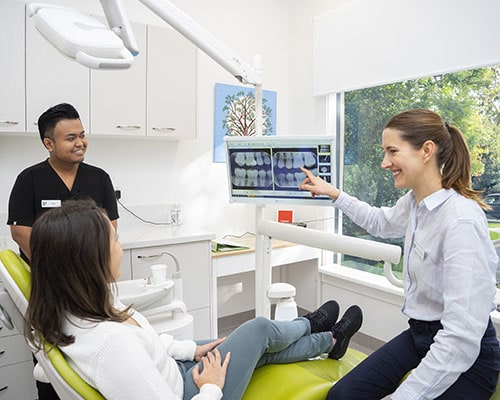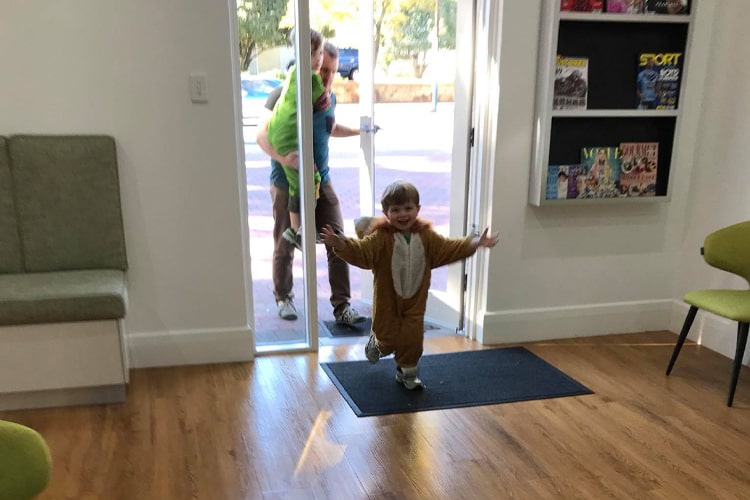Preparing your child to visit the dentist
Our team at Fullarton Park Dental understand the importance of giving your child the tools to look after their oral health and feel confident in the dental setting. We recognise that each child is different, and ensuring that we meet your little one’s needs is at the forefront of everything we do.
What to expect on your child's first visit?
Our dental visits are based on your child’s age and what they feel comfortable with. If your child is particularly nervous or has had an unpleasant dental experience previously, please let us know so that we can take extra special care to put your child’s mind at ease.
First and foremost, we want to get to know your child and make sure they are relaxed with us and their surroundings. If it is your little one’s first visit to the dentist, we will gently introduce them to dental treatment with a dental check-up. Shy children may like to ride in the chair on mum or dad’s lap while more confident children sit on the dental chair by themselves.
During the check up, we will count the teeth while checking your child's bite and gums. Then we will have a look at how many "bugs" (dental plaque) are sitting on the teeth. At the end, we will talk about effective brushing and what foods are best for keeping our teeth strong. Depending on how your child is feeling, we may polish their teeth and finish off by applying some yummy tooth cream that prevents decay from developing. We have a broad range of fluoride products, and your child can choose their favourite flavour to try.
For some children, it can take several visits before they feel comfortable enough to let the dentist check their mouth – and that is totally fine! Our goal is to keep your child’s teeth healthy for life, and our gentle and patient clinicians will aim to get to know your little one and build their confidence step by step. During this early stage, we aim to keep appointments quick and fun.
For older children, we may require x-rays to get a closer look at their teeth. After their check-up, we may recommend preventive or restorative treatments your child could benefit from and offer advice on how to take care of their oral health in between visits.
If your child requires further treatment, we will discuss the reasons for this and the options that are available. In most cases, we believe it is best to complete treatment at a subsequent appointment rather than doing it on the same day. This will ensure that your child has a gentle introduction to dentistry and won’t be overwhelmed. Once we have decided upon a treatment plan, we will find a suitable time for you and your child to return.
How should I explain dental visits to my child?
We suggest keeping it simple. Try explaining that you are “going to visit the dentist and they will count your teeth and make sure they’re strong and healthy". It may also help to practice opening their mouth wide "like a lion" so our clinicians will be able to see their back teeth better. If you have a soft toy with a mouth, or a toy that your child particularly likes, please bring it along - we would love to meet their Teddy and check if Teddy has strong teeth too!
It is important that your child does not have any negative preconceptions about the dentist. Avoid using the dentist as a threat (for example; if you don’t brush your teeth, you will need lots of fillings!). It’s important that the dentist is explained in a positive way, with emphasis on the idea that the dentist is here to help your child. Our lovely clinicians will explain everything to your child in a way that makes sense to them without frightening them. We tend to avoid terms with negative or threatening connotations - for example, we don't have "needles" or “injections”, we have "magic sleepy water" and our electric tooth polisher is fondly known as the "buzzy bee tooth tickler".
Below are some extra tips on preparing your child for their very first dental visit:
- Be Positive
Children usually look to their parents in order to recognise how they should feel about a certain situation. If you feel nervous about your child's visit, try your best not to let this show. A parent’s uneasiness towards the dentist often becomes the cause of the child’s fear. Try speaking about the dentist in positive, non-threatening terms. - Explain what to expect
Make sure your child has some idea of what will happen when they visit the dentist so they won't be surprised when their dentist asks to look in their mouth. You may find that having ‘trial runs’ of the dentist at home can make your child feel better prepared for their appointment. Break out your child’s toothbrush and have them sit in a chair. Pretend you’re the dentist and count and brush their teeth. Talk through what you’re doing and why oral hygiene is so important. Then, swap roles or let your child have a turn being the dentist with their favourite stuffed animal. - Bring a special toy
If your child has a favourite toy, bring it along! Having a comfort toy by their side may make them feel more calm and secure. Children generally learn the best through active engagement and play, and we find best way to introduce your child to the world of dentistry is by performing a check up on their favourite toy first. - Schedule a morning appointment
Like adults, feeling tired or hungry can affect our moods and make them less likely to cooperate. Timing your visit around naps and mealtimes can be the key to success. - Offer rewards
Fullarton Park Dental believes that great behaviour should be rewarded…which is why we have an extra special treasure chest in our surgeries! At the end of your child’s appointment, they can choose a special prize from the treasure chest for doing such a great job.
Video Transcript
One of the things we get asked quite a bit is, 'When should I start to bring my children to the dentist?' It's a tricky one, and it's a fair question to ask. What we tend to tell our patients is that you know your kids better than what we do. It's a good chance to have a good chat to them about it and let them know what dentists do and that there's someone who will have a look at their teeth and count them for them, and it's like a tooth doctor who checks them.
And if you feel that they're old enough to come in, that's a good chance to bring them in. Normally around about three or four is a good time to start. Some people say a bit earlier, but it can be a bit tricky to get them to sit in the chair and things like that. But we try and make it as comfortable for young patients as we can and give them a really positive first experience, give them a ride in the chair, let them push through the buttons and things. They've got a positive image of the dentist and a positive sense of looking after their teeth really well as well.
So yeah, if you think this would be helpful with anyone else that you know who have got young kids, by all means, feel free to share this with them or tag them below. And we'll see you next time, thanks, bye.





